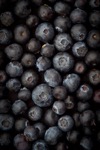| Scientific: | Vaccinium myrtillus |
|---|---|
| Other: | Bilberry (Europe), huckleberry & blueberry (North America ) |
| Family: | Ericaceae |
| Synonym: | Vaccinium angustifolium |
Bilberry grows in Northern Europe. Like the North American blueberries (Vaccinium angustifolium), their edible berries contain antioxidants including anthocyanins. The main difference between the two species is bilberries contain roughly 5 times the condensed tannins than blueberries making them more astringent. Traditionally, strong decoctions of the dried fruit treat diarrhea and dysentery. Furthermore, their gentle action makes them suitable treatment for children's diarrhea. Research shows they possess antibacterial and also antiparasitic activity against giardia the cause diarrhea. Animal studies suggest that bilberries may also improve colitis.
Bilberries appear to lower cholesterol, lower blood pressure, decrease inflammation, and improve blood sugars. Bilberries may thus have the potential to reduce diabetes and cardiovascular diseases. Historically bilberry was used for eye conditions, and preliminary research suggests it prevents macular degeneration.
The fresh fruit can be used to prevent degenerative diseases; the dried berries can be used specifically for diarrhea.
Gastrointestinal
• diarrhea, particularly with children (dried fruit)†
• constipation, sluggish bowels (fresh berries)
Urinary
• prevents lower urinary tract infections
Cardiovascular
• may prevent stroke and cardiovascular disease (berries)
• reduced vascular tone (berries)
• atherosclerosis (berries)
• capillary fragility
• hemorrhoids (also post-hemorrhoidectomy)
• varicose veins
• venous insufficiency
Ophthalmic
• retinopathy (berries)
• macular degeneration
• impaired night vision
• cataracts
• glaucoma
Cancer
• colorectal cancer
• breast cancer
† Note: bilberries as several times more astringent than north american blueberries and thus is better suited for diarrhea.
• Antioxidant
• Astringent
• Nutritive
• Antiadherence
• Laxative
• Hypoglycemic
• Antiseptic (Urinary )
Berry:
• Anthocyanins • Act As Condensed Tannins That Stabilize Vascular Tissue; May Have Antimicrobial Effects
Leaf:
• Has Greater Antimicrobial Effects Than Its Berries
Berries:
• Dried: 20-60 g/day (~1/4 cup)
• Fresh: 15 g of berry
Note: the dried berries are indicated for diarrhea, not the fresh berries.
Long-term use: Berries are safe. Leaves are generally safe but long-term use safety has not yet been established.
- Anti-coagulant therapy • monitor patients with concomitant use.
- Iron supplements • may reduce the absorption of non-heme iron. Take iron supplements a few hours apart.
Barnes J, Anderson LA, Phillipson JD. Herbal Medicines, 3rd ed. London: Pharmaceutical Press, 2007.
Bone K. Principles and Practice of Phytotherapy. Edinburgh: Churchill Livingstone, 2000.
Bone K. A Clinical Guide to Blending Liquid Herbs: Herbal Formulations for the Individual Patient. St Louis, MO: Churchill Livingstone, 2003.
Brinker F. The Toxicology of Botanical Medicines, 3rd ed. Sandy, Oregon: Eclectic Medical Publications, 2000.
Felter HW, Lloyd JU. King's American Dispensatory. 1898. http://www.ibiblio.org/herbmed/eclectic/kings/main.html. Accessed: August 19, 2006.
Hoffman D. Medical Herbalism. Rochester, Vermont: Healing Arts Press, 2003.
Weiss RF. Herbal Medicine. Beaconsfield, England: Beaconsfield Publishers Ltd, 1988.
Williamson EM, ed. Major Herbs of Ayurveda. Edinburgh: Churchill Livingstone, 2002
Disclaimer: This content is subject to change. The information is intended to inform and educate; it does not replace the medical evaluation, advice, diagnosis or treatment by a healthcare professional. www.nhpassist.com © 2014 NDAssist Inc. and/or its affiliates. All rights reserved.

|
Bilberry (Europe), huckleberry & blueberry (North America )
SummaryBilberry grows in Northern Europe. Like the North American blueberries (Vaccinium angustifolium), their edible berries contain antioxidants including anthocyanins. The main difference between the two species is bilberries contain roughly 5 times the condensed tannins than blueberries making them more astringent. Traditionally, strong decoctions of the dried fruit treat diarrhea and dysentery. Furthermore, their gentle action makes them suitable treatment for children's diarrhea. Research shows they possess antibacterial and also antiparasitic activity against giardia the cause diarrhea. Animal studies suggest that bilberries may also improve colitis. IndicationsSign in requiredActionsSign in requiredConstituentsSign in requiredPosologySign in requiredSafetySign in requiredInteractionsSign in requiredReferencesSign in required |
|---|